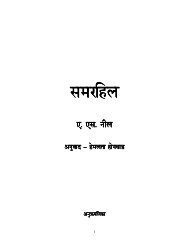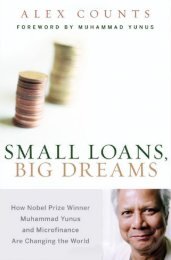Michael Ernest Sadler (1861â1943) - Vidya Online
Michael Ernest Sadler (1861â1943) - Vidya Online
Michael Ernest Sadler (1861â1943) - Vidya Online
You also want an ePaper? Increase the reach of your titles
YUMPU automatically turns print PDFs into web optimized ePapers that Google loves.
The following text was originally published in<br />
PROSPECTS: the quarterly review of comparative education<br />
(Paris, UNESCO: International Bureau of Education), vol.24, no.3/4, 1994, p. 455–69<br />
©UNESCO: International Bureau of Education, 2002<br />
This document may be reproduced free of charge as long as acknowledgement is made of the source.<br />
MICHAEL ERNEST SADLER<br />
(1861–1943)<br />
J. H. Higginson 1<br />
<strong>Michael</strong> <strong>Ernest</strong> <strong>Sadler</strong>, born into a Radical home in 1861 at Barnsley in the industrial north of<br />
England, died in Oxford in 1943. His life spanned a rapidly changing period of European<br />
history. His thinking encapsulated three revolutions: that of France in 1789 (significantly<br />
Professor <strong>Sadler</strong> always opened his lecture course for Manchester students on this theme);<br />
Great Britain’s own Industrial Revolution in the nineteenth century; and the 1917 Russian<br />
Revolution. He experienced, from the British viewpoint, three wars: that in South Africa with<br />
the Boers at the beginning of the century; the breaking up of nations in the First World War of<br />
1914–18; and the outbreak of the Second World War in 1939. He also witnessed attempts at<br />
new international structures such as the League of Nations, and the gradual transformation<br />
from colonialism and imperialism to a commonwealth of nations. From a study of the long<br />
life of this dynamic man we can detect the fusion of all these influences in shaping the<br />
thought and social ideals of <strong>Michael</strong> <strong>Sadler</strong> into coherent policies for advancement and action.<br />
In the days of his youth 2<br />
<strong>Sadler</strong> cherished his English heritage. His early youth was coloured by the fact that one of his<br />
forebears, <strong>Michael</strong> Thomas <strong>Sadler</strong>, was among the pioneers of the Factory Acts. His early<br />
memories were full of associations with the leaders of the working-class movement in the<br />
north of England. Remembering these pioneers, <strong>Sadler</strong> recorded: ‘I can see how much<br />
religion deepened their insight and steadied their judgement, and saved them from coarse<br />
materialism in their judgement of economic values. This common heritage was a bond of<br />
social union. A social tradition is the matrix of education’. 3 <strong>Sadler</strong>’s schooling was typical of<br />
his times. It gave him a diverse background, which was to be reflected throughout his life in<br />
his interpretation of the process and content of education. When he was 10 years old, he was<br />
sent to a private boarding school at Winchester where the atmosphere was markedly<br />
conservative. <strong>Sadler</strong> recalls:<br />
Think of the effect on my mind of being swug from the Radical West Riding…where I never heard the<br />
Conservative point of view properly put, to where I was thrown into an entirely new atmosphere in which the old<br />
Conservative and Anglican traditions were still strong. 4<br />
From this preparatory school he moved to Rugby in the English Midlands, where he spent his<br />
adolescence in an atmosphere entirely different from that of the Winchester school. His<br />
masters were enthusiastic upholders of Oliver Cromwell and the Puritan Revolution. The<br />
young <strong>Sadler</strong> soon found himself in critical revolt against the Cavalier and Anglican<br />
traditions.<br />
The contrasting impact of this schooling has a far-reaching influence in <strong>Sadler</strong>’s<br />
student days at Oxford. He went to Trinity College in 1880. There he soon came under the<br />
spell of leading historians such as T.H. Green and Arnold Toynbee. But it was John Ruskin<br />
1
who completely overwhelmed the undergraduate. <strong>Sadler</strong> has left on record how, in his second<br />
year at Trinity College, a short course of lectures was announced, to be given in the<br />
University Museum by Ruskin. Tickets were difficult to get because of the popularity of the<br />
speaker. After a warm description of Ruskin’s picturesque appearance, <strong>Sadler</strong> articulates a<br />
favourite conviction when he writes:<br />
Nominally these lectures of Ruskin’s were upon Art. Really they dealt with the economic and spiritual problems<br />
of English national life. He believed, and he made us believe, that every lasting influence in an educational<br />
system requires an economic structure of society in harmony with its ethical ideal. 5<br />
That belief persisted to the end of <strong>Sadler</strong>’s life and is recurrent in his many analyses of<br />
foreign systems of education.<br />
When, in July 1882, the examinations lists were issued, <strong>Sadler</strong> had gained a first-class<br />
degree. A month earlier he had become President Elect of the Oxford Students’ Union, a field<br />
of public debating experience that has produced many an English politician.<br />
During the next few years, while continuing his academic studies, the question of what<br />
career he should choose became increasingly pressing. He was offered a number of jobs—the<br />
headship of a school, a position in India, an invitation to take up journalism. Talent-spotters<br />
who had noted his eloquence at the Oxford Union debates foresaw a political career for him.<br />
But <strong>Sadler</strong> could not commit himself to the monopoly of any one political party. Once again,<br />
the conflicting views that had coloured his upbringing emerged. He analyses his situation<br />
thus:<br />
These variant impressions spoilt me forever for parliamentary life in English politics. The experience that I<br />
gained then and since made me feel that England is united only in supreme moments of common danger, and is<br />
really at least two Englands, each of which inclines to a different form of social organization, and has different<br />
preferences in social ideas, as well as in religious observance and in its attitude to state control. The one is<br />
ultimately feudal and hierarchical; the other oscillates between being individualistic and being bureaucratic. 6<br />
<strong>Sadler</strong> coined the phrase the two-mindedness of England and throughout his life, even to his<br />
last writing, he reiterated this conviction.<br />
From adult education to secondary education<br />
Ultimately, this brilliant young academic decided that what would interest him most after<br />
graduation would be a job in the field of adult education. In May 1885 he became Secretary to<br />
the Oxford University Standing Committee of the Delegacy for Local Examinations. Thus<br />
began an energetic career as travelling lecturer, tutor and organizer of lectures for the working<br />
classes in the industrial centres of the Midlands. On my desk I have before me a typical<br />
brochure and syllabus from 1885 which announces:<br />
Syllabus of a course of lectures on past, present and future of the working classes, and how to better their<br />
condition with a statement and criticism of the views held by famous political economists by <strong>Michael</strong> E. <strong>Sadler</strong>,<br />
B.A. 7<br />
<strong>Sadler</strong> remained as a peripatetic tutor for some nine years. During this time he gave<br />
expositions of the work of Jean-Jacques Rousseau, Adam Smith, Claude Henri de Rouvroy<br />
Comte de Saint-Simon, François-Marie-Charles Fourier, Robert Owen, Frédéric Bastiat and<br />
Ferdinand Lassalle. He was one of the first English scholars both to recognize the significance<br />
of Karl Marx and to give his students an assessment of Marxist doctrine. At the end of a<br />
detailed account of Marx’s life and writings, <strong>Sadler</strong> sums up in 1889:<br />
2
Karl Marx was a critical, not a constructive, influence. He exposed the evil of the existing system; but his<br />
suggestions of practical reform for the future are not as valuable as his indictment of the past. 8<br />
So effective was <strong>Sadler</strong>’s work for University Extension that he was invited in 1891 to give<br />
three talks to the National Conference on University Extension in Philadelphia. This was the<br />
first of three visits he made to the United States. At the conclusion of this tour, he made a<br />
prophecy to his American colleagues and told them:<br />
Your Common Schools, I take it, go as far as our Elementary Schools in fitting pupils for the University. The<br />
next step we have to take in England is that of Secondary Education a medium between Primary and the<br />
University. 9<br />
In 1893 <strong>Sadler</strong> wrote personally to influential members of Oxford University, proposing that a<br />
petition should be organized to the Hebdomadal Council, requesting that body to invite a<br />
conference to come to Oxford to discuss the future development of secondary education in<br />
England. This conference was the first of its kind to be held in any British university. It<br />
brought together representatives from the public schools, universities, charity commissioners,<br />
school boards and the teachers’ unions, to consider how secondary education could be<br />
extended. The outcome was the setting up of a Royal Commission under James (Lord) Bryce,<br />
and <strong>Sadler</strong> was one of its most active members. Some have regarded him as the principal<br />
author of its ultimate report. A particular feature of this investigation was the sending of<br />
questionnaires on the main problems of secondary education, as a bridge between primary and<br />
higher education, to the countries of Europe, the then British Empire, and the United States.<br />
This was one of <strong>Sadler</strong>’s first ventures into the field of comparative education, a field in<br />
which he was soon to become an outstanding pioneer. Through the inquiries of the Bryce<br />
Commission he established many personal relationships with overseas educators, which were<br />
to stand him in good stead in the next phase of his career.<br />
Research director<br />
In the 1890s, while investigating the contemporary scene in secondary education, <strong>Sadler</strong><br />
became aware of the insularity of the British Government’s education policies. He felt that the<br />
inadequacy of commercial and industrial training in the United Kingdom needed to be<br />
challenged. He was well acquainted with technological development in Germany. He also<br />
knew of the pioneer studies in comparative education sponsored by the United States. He had<br />
influential friends in the government and he succeeded in persuading the Vice-president of the<br />
National Committee on Education, A.H.D. Acland, that the existing department in London<br />
should aim at increasing British awareness of what was taking place educationally in other<br />
countries. <strong>Sadler</strong> himself records:<br />
A study of the publications of the United States Bureau of Education in Washington D.C., then under the<br />
direction of the venerable philosopher Dr. W. T. Harris, with whom I had many conversations during a tour<br />
which we made in Pennsylvania, had kindled in my mind a belief that a new organ of inquiry and report, if<br />
attached to the Education Department in Whitehall in London, might prove useful in stimulating public<br />
opinion. 10<br />
That new organ of inquiry and report was set up in 1895, as the Office of Special Inquiries<br />
and Reports. <strong>Sadler</strong> was appointed its first director. During his tenure, from 1895 to 1903, he<br />
initiated eleven massive volumes of reports covering what was happening educationally in<br />
many European countries, the territories of the then British Empire and the United States.<br />
Today, this material, produced at the turn of the century, provides a wealth of data,<br />
articulating factors likely to be informative for historians, sociologists and comparativists who<br />
3
wish to identify the roots and influences that have shaped contemporary problems across the<br />
world. As <strong>Sadler</strong> contemplated the transition from the nineteenth to the twentieth century he<br />
speculated that:<br />
Never before in history has there been so worldwide an awakening to the profound significance of National<br />
Education; we find the former everywhere: in France, in Germany, in Scandinavia, in Holland and in Belgium, in<br />
Austria, in Hungary, in Italy and in Switzerland. We can discern its workings in Russia. Japan is full of it. It is<br />
stirring in many parts of the British Dominio overseas, especially in Canada. And in the United States the<br />
educational movement is in some ways the most remarkable in the world. 11<br />
Characteristically, having outlined the ramifications of this world movement, <strong>Sadler</strong> puts<br />
forward a leading question: What is the significance of this remarkable disturbance of thought<br />
on the subject of Education?<br />
This question permeates the assembly of data that <strong>Sadler</strong> and his researchers gathered<br />
for the eleven volumes of Special Reports. In examining the data we can discern that <strong>Sadler</strong><br />
evolved a methodology, which was later to be described by Brian Holmes as the problem<br />
method. As Research Director, <strong>Sadler</strong> required those who investigated for him to deal with<br />
specific problems, identifying relevant factors within their social contexts, and, if possible, to<br />
note any pointers or implications for future action. He defined his function as Director on<br />
several occasions. Thus, in the Government Blue Book issued in 1903, ostensibly making<br />
public the circumstances of <strong>Sadler</strong>’s resignation from the Office, <strong>Sadler</strong> writes:<br />
The chief work of an educational intelligence office [...] is to collect, summarize, and publish various kinds of<br />
educational experience, with a view to (1) getting what is sound and true from a number of discrepant opinions,<br />
(2) informing the nation how it stands in regard to educational efficiency as compared with other nations, and (3)<br />
promoting, as far as possible, general consent and agreement as to the wisest and most fruitful line of<br />
development of national education. 12<br />
Throughout his long life <strong>Sadler</strong> had particular interests and personal friendships in Germany,<br />
France and the United States. The opportunity remains for some scholar to make studies<br />
across the period of <strong>Sadler</strong>’s lifetime of his interpretation of all these links. Here space<br />
permits mention only of Volumes IX, X and XI of Special Reports. Volume IX, published in<br />
1902, deals with Education in Germany. It contains one of <strong>Sadler</strong>’s longest and most<br />
penetrating assessments, with informative comparisons with France, the United Kingdom and<br />
the United States. Re-reading this scholarly analysis, with its implications for the Europe of<br />
1992,I am reminded that it was this far-sighted Englishman who lectured to an audience in<br />
Frankfurt-am-Main, two years before the outbreak of the First World War, on the theme<br />
England’s Debt to German Education’. In pasing, it is a pleasure to note that Jack Sislan<br />
introduced a seminar on <strong>Sadler</strong>’s comparative studies of Germany and England into teacher<br />
education at the University of Hamburg in 1971 and continued this as an well-attended feature<br />
until his retirement in 1986. He also gave lectures on <strong>Sadler</strong>’s writings, in 1975, at Kent State<br />
University in the United States and, in 1977/78, at the University of Botswana and Swaziland,<br />
where he was visiting professor.<br />
Volumes X and XI of Special Reports are both devoted to Education in the U.S.A.<br />
They contain a comprehensive series of studies by the authorities of the day, illuminating<br />
many aspects of the American scene. One of the most penetrating papers is an analysis by<br />
<strong>Sadler</strong> himself of ‘A Contrast between German and American Ideals in Education’. There<br />
survives a revealing exchange of letters, in 1931, between <strong>Sadler</strong>, then Master of University<br />
College, Oxford, and Elmer Ellsworth Brown, Chancellor of New York University. This<br />
exchange is published in a brochure under the headline, ‘The Only Tragedy Is Failure to<br />
Realize One’s Capacity for Good. Both academics were much concerned about how higher<br />
education must be rationally related to the changing needs of society’.<br />
4
<strong>Sadler</strong>’s days as a civil servant in government employ grew increasingly frustrating.<br />
He wanted to exercise the autonomy traditional in the English universities, to appoint<br />
competent researchers of his own choice, to investigate problems that he considered relevant<br />
to the English scenario. His government superiors wished to control the scope of the<br />
researches, especially if they were considered inconsistent with prevailing ministerial policies.<br />
<strong>Sadler</strong>’s resignation from the Office of Special Inquiries and Reports in 1903 was widely<br />
reported in the press. Questions about his resignation were raised in the House of Commons; a<br />
Blue Book was published giving a detailed account of the background; and his departure<br />
became something of a cause célèbre.<br />
Professor of history and administration of education<br />
Thus, at the age of 42, <strong>Michael</strong> <strong>Sadler</strong> found himself without a job. But before long, he was<br />
approached by the University of Manchester and invited to a Chair, the first of its kind in the<br />
United Kingdom, as part-time professor of history and administration of education. His duties<br />
required him to be resident in Manchester for one term each academic session, to give a<br />
lecture course to intending teachers, and to take part in such tutorial work as the Department<br />
of Education might require. In fact, Professor <strong>Sadler</strong> contributed a course of twenty-four<br />
lectures per session from 1903 to 1911 on ‘The History of Education in England, 1800–1911’.<br />
The course always began with a diagnosis of the effects of the Industrial Revolution, the<br />
impact of Methodism and the Evangelical movement, and the French Revolution upon<br />
English education. To such a course the part-time professor brought the vast background he<br />
had acquired as Research Director. While in the latter post he had given a lecture, now often<br />
quoted as a classic, to a Teachers’ Conference in Guildford, on the theme, ‘How Far Can We<br />
Learn Anything of Practical Value from the Study of Foreign Systems of Education?’ That<br />
focus on ‘practical value’ was typical of this empirical Englishman, as was his answer given<br />
in the course of the lecture:<br />
The practical value of studying, in a right spirit and with scholarly accuracy, the working of foreign systems of<br />
education, is that it will result in our being better fitted to study and understand our own. 13<br />
The period 1903–11, with its limited duties in the University of Manchester, gave <strong>Sadler</strong><br />
numerous opportunities to pursue his special interests. Quite apart from his formal duties at<br />
the university, he devoted much time to carrying out investigations and writing reports for<br />
some of the counties and boroughs that had acquired secondary-education powers under the<br />
Education Act of 1902. Under the Act, local authorities were faced with massive problems of<br />
reorganization, and they sought expert advice. No one was more equipped to give that advice<br />
than the man who had been influential in formulating the proposals of the Royal Commission<br />
on Secondary Education of 1895 was. These ‘<strong>Sadler</strong> Reports’ contained analyses of the<br />
problems and possibilities for the development of secondary education. They are enriched by<br />
his studies of foreign practice, as for instance the volume he prepared for the Liverpool<br />
Authority when he compared the opportunities for a great port with the experience available<br />
in the Hanseatic port of Hamburg, of which he had first-hand knowledge.<br />
One of <strong>Sadler</strong>’s lifelong concerns was the education of the young wage earner. He<br />
wrote and spoke about this many times. He was deeply interested in the pioneering work of<br />
Georg Kerschensteiner in Munich and visited some of the continuation schools under his<br />
supervision. One outcome was a volume, edited by <strong>Sadler</strong>, on Continuation Schools in<br />
England and Elsewhere, published in 1907. Many years later he wrote an appraisal of<br />
Kerschensteiner’s work for The Times of London in which he said:<br />
5
To go round the continuation schools in Munich in his dynamic company was like finding Plato in charge of a<br />
huge departmental store. . . . He believed that education for the ordinary men and women must be woven into the<br />
practical work of life. For him, Allgemeine Bildung for the multitude must integrate the power of the body and<br />
the powers of the mind. 14<br />
Another theme recurrent in <strong>Sadler</strong>’s writing is the issue of moral education. In 1908 he edited<br />
two volumes of Moral Instruction and Training in Schools, reporting an international inquiry.<br />
Volume 1 includes thirty-three papers, covering the United Kingdom, and Volume II covers<br />
France, Belgium, Denmark, Norway, Germany, the United States, Canada, Australia, New<br />
Zealand and Japan.<br />
It is fascinating to discover how moral education, religious values and concepts of<br />
democracy are interwoven in the data of these two volumes. Professor <strong>Sadler</strong> opens with a<br />
lengthy introduction in which he expresses a conviction characteristic of so many of his<br />
surveys of education. He writes:<br />
The influence of education upon conduct and character is the subject discussed in these volumes. Its chapters are<br />
the outcome of an inquiry undertaken with the purpose of gathering information as to the methods of moral<br />
instruction now in use in schools in different countries. 15<br />
Many years before, he had told his Guildford audience of teachers that education was by no<br />
means the product of learning schools, a matter merely of schools and schoolrooms, and he<br />
added<br />
Surely what we in England really mean in our hearts by education is that great aggregate of the influences which<br />
come to us in our homes, at church or chapel, in daily life, in intercourse with our contemporaries, in love of<br />
home and father and mother in all the thousand streams of influence and suggestion which in a free country<br />
converge upon each individual life, and shape ideals of conduct. 16<br />
It is thought provoking to speculate on how <strong>Sadler</strong> would have identified moral education in<br />
our day of television and satellite intrusion into the home, and the leisure activities of the<br />
peoples of the world.<br />
Higher education<br />
<strong>Sadler</strong> was approached in 1911 by the University of Leeds and invited to become Vicechancellor.<br />
It was an invitation that would take him back to his own origins in the West<br />
Riding of Yorkshire. It has been said of him:<br />
As possibly the foremost scholar of that time, he recognized the opportunity the Leeds post then offered to give<br />
rein to his own missionary zeal: to build up a centre of learning in an industrial city which could widen<br />
educational opportunities for those who lacked them. 17<br />
Of the twelve years that <strong>Sadler</strong> was Vice-chancellor, four were war years, three were years of<br />
severe post-war depression, and two were years of economic and social unrest in the West<br />
Riding of Yorkshire. Nevertheless the university grew steadily. The buoyancy typical of<br />
<strong>Sadler</strong> led him to take an optimistic and positive approach to creating a large civic university<br />
A glance through the 600 items listed in Oliver Pickering’s Sir <strong>Michael</strong> <strong>Sadler</strong>: A<br />
Bibliography of His Published Works reveals how continuously <strong>Sadler</strong> thought about<br />
university development, about the relationship of arts and sciences and technological<br />
education, until his retirement as Master of University College, Oxford, in 1934. His deep<br />
knowledge of the German system was always at the back of his mind as he steered a vigorous<br />
northern university through the days of the First World War. In its midst he produced a paper,<br />
6
‘What Should be the Connection between Government and the University?’ One that makes<br />
challenging reading in today’s reconstruction and widening of higher educational<br />
opportunities throughout the world.<br />
Perhaps most significant in making an evaluation of <strong>Sadler</strong>’s thinking about<br />
university development would be an analysis of the task assigned to him by the British<br />
Government towards the end of the First World War. The Secretary of State for India, Austen<br />
Chamberlain, invited <strong>Sadler</strong> to accept the chairmanship of a commission the government<br />
proposed to appoint to inquire into the affairs of Calcutta University. Chamberlain wrote:’<br />
Lord Chelmsford [the Viceroy] informs me that they hope for the solution of the big political<br />
problems of India through the solution of the educational problems’. 18<br />
After some hesitation <strong>Sadler</strong> accepted the invitation. Under his direction the<br />
Commission far exceeded its initial terms of reference. The result was thirteen volumes issued<br />
in 1919, providing a comprehensive sociological account of the context in which Mahatma<br />
Gandhi was campaigning for the end of the British Raj and the independence of India. From<br />
the lines of inquiry pursued it is possible to deduce a conception of expanding higher<br />
education that goes far beyond the traditional university image in its search to relate higher<br />
education to the twentieth century, with its increasing availability of educational opportunities<br />
to women.<br />
Prior to the publication of the Calcutta University Report, <strong>Sadler</strong> delivered a private<br />
address to the Senate of Bombay University. He put forward his personal conclusions as he<br />
surveyed The Educational Movement in India and Britain. It was a far-sighted address,<br />
characteristic of <strong>Sadler</strong>’s belief in the inter-relationship of all the various levels of education<br />
and the importance of teacher training. He warned his listeners about producing an academic<br />
proletariat with job expectations that could not be fulfilled. And finally he told the members<br />
of the Senate:<br />
And in India you stand on the verge of the most hazardous and inevitable of adventures—the planning of<br />
primary education for the unlettered millions of a hundred various races. I doubt whether the European model<br />
will fit Indian conditions. If you want social dynamite, modern elementary education of the customary kind will<br />
give it to you. It is the agency that will put the masses in motion. But to what end or issue no one can foretell. 19<br />
The last decade<br />
In 1923, at 62, Sir <strong>Michael</strong> <strong>Sadler</strong> (he was knighted for his work as President of the Calcutta<br />
University Commission) was within three years of retirement from the vice-chancellorship of<br />
the University of Leeds. An informal and confidential approach was made by one of the<br />
Fellows of University College, Oxford, to find out whether he would be willing to serve as<br />
Master, a post which would allow him another thirteen years of service if he so wished. It was<br />
an opportunity that would, apart from his formal duties as Head of a House, allow him plenty<br />
of scope for his diverse national and international interests. He was duly elected by the<br />
Fellows and so returned to Oxford, the cradle of his undergraduate years. He took up the new<br />
position, which he held until his retirement in 1934. It is on record that when, after an absence<br />
of nearly thirty years, <strong>Sadler</strong> came back to Oxford, some academics asked, with a touch of<br />
nervousness about this dynamic personality, What will he do now in Oxford?<br />
This last decade of public service gave <strong>Sadler</strong> many opportunities to present, from his<br />
wide-ranging background, matured reflections and diagnoses of the problems of education in<br />
a rapidly changing world. Lord Asa Briggs, the social historian who was then a young don at<br />
Oxford, points out in his foreword to the <strong>Sadler</strong> anthology that his writings ‘spanned many<br />
decades and have long-term meaning because they are concerned with the long-term<br />
development of industrial society and a more democratic world’. 20<br />
7
In 1930 <strong>Sadler</strong> paid his third visit to the United States. He addressed the Pennsylvania<br />
Schoolmen on ‘An Englishman’s Thoughts on the Service of American Education to the<br />
World’. He also lectured to the faculty and students of Teachers College, Columbia<br />
University, New York, on the general theme ‘The Outlook in Secondary Education’. His three<br />
lectures were entitled ‘Progress And Pitfalls’, ‘Youth and Tests’ and ‘A Liberal Education’.<br />
These three lectures taken together sum up <strong>Sadler</strong>’s experience and thinking. In the first he<br />
attempts a living portrait gallery of the many young people from different nations whom he<br />
had met. In the second, he concentrates what he has often written and spoken about with<br />
reference to examinations and assessment. In the third, A Liberal Education a historical<br />
retrospect (which ranges from Plato and Aristotle to Cardinal Newman, Matthew Arnold, T.<br />
H. Huxley and R. H. Tawney), <strong>Sadler</strong> crystallizes his own convictions in a masterly<br />
peroration. In savouring its inspiration for our own day I would substitute for the term a<br />
liberal education (which by now has drawn to itself a limited historical connotation), the<br />
phrase, a liberating education. Such a substitution would, I believe, have been acceptable to<br />
<strong>Sadler</strong> himself as he grappled with the problems of the enslaving media conditioning of young<br />
people. Ever the optimist, he concluded for his American audience with the words:<br />
But we can go forward rejoicing at what has already been achieved and with confidence that by slow degrees we<br />
shall come more nearly to the attainment of our hopes. We realize that a liberal education is a discipline of body,<br />
mind and spirit; a discipline which is not only individual, but communal. Our eyes have bee n opened to the truth<br />
that the angle of a liberal education subtends the arc of life from the nursery to old age. We perceive that the<br />
presence of a liberal education is not signified exclusively by any label, certificate or academic degree; above all<br />
that a liberal education does not consist in the absorption of inert ideas in cramming for an examination. 21<br />
Having thus cut through the undergrowth of much contemporary educational practice, <strong>Sadler</strong><br />
may well be required to give us a somewhat more positive delineation of what he wished to<br />
see as the harvest of a liberating education. His answer is unequivocal and he rounds off his<br />
peroration by focusing on an attitude of mind. The fruits of the education he visualizes will<br />
be:<br />
Evinced in an attitude of mind, liberated from apathy and from self-will, in an attitude of mind toward life, work,<br />
duty, and the realities of belief. In it are blended freedom and discipline; questioning and awe; the education of<br />
the body and the education of the mind; training and self-training; science and letters; preparation for livelihood<br />
and leisure alike. 22<br />
During his last decade as Master of University College, <strong>Sadler</strong> was much preoccupied with<br />
the menacing international situation that was developing in Europe. In 1933 he gave an<br />
address at Rhodes House in Oxford based, as he said, on my personal experience during the<br />
last nine months. He proceeded to make an analysis of the impact of Marx’s Das Kapital and<br />
Adolf Hitler’s Mein Kampf. He made a number of deductions about the interrelationships of<br />
economic and spiritual forces and suggested:<br />
Not only the European and Australian and the American, but the bronze, black and Far Eastern worlds are<br />
involved together. But because the unrest in our minds is spiritual as well as economic, the course of the<br />
revolutions will proceed at a different pace in different regions. . . . I conceive the outcome of this worldwide<br />
revolutionary movement will be the establishment not of a new social order but of new orders. . . . The hope that<br />
after a world crisis and ‘clear up’ there will emerge one universal type of social organization seems to me oversimplified.<br />
23<br />
In 1934 <strong>Sadler</strong> entertained von Ribbentrop, the German Ambassador to the United Kingdom,<br />
for a weekend at the Master’s Lodgings in University College. He was an unwelcome visitor<br />
and <strong>Sadler</strong> has left a vivid account of the exchanges that took place. After dinner, von<br />
Ribbentrop delivered a defence of National Socialism, declaring that it had saved Germany<br />
8
from Bolshevism. In the course of this conversation, the Ambassador commented on how his<br />
nation had struggled to preserve the very elements of Western civilization for which, if<br />
needed, the individual must be sacrificed to the cause. Characteristically, <strong>Sadler</strong> slipped in a<br />
question, and what are those elements of Western civilization that you are so anxious to<br />
preserve?<br />
Final comments<br />
During the passage from uneasy peace to the outbreak of the Second World War in 1939,<br />
<strong>Sadler</strong> was a man of troubled spirit. At 78 years of age, he felt the reality of the power of evil<br />
in mankind’s temporal affairs. His diary is full of observations on the spiritual issues of the<br />
Second World War that he felt as a tragic disturbance in the mind of man. He tried to make a<br />
diagnosis of the German situation during the Nazi period. An extract from his diary for 25<br />
November 1940 reads:<br />
The Germans (always apt to overdo things) have, under Nazi leadership and compulsion, pushed to an extreme<br />
several tendencies that were visible before the war and, if moderately and cautiously pursued, would have met<br />
with full general agreement:<br />
1. Systematic physical training for all young people.<br />
2. Encouragement of the influence of corporate life in boarding schools.<br />
3. Encouragement of the emotional life—through art and assemblies—fostering of individual self-confidence in<br />
a framework of comradeship and collective opinion and restraint upon tendencies to lay too-inclusive stress<br />
on intellectual gymnastics.<br />
4. Attempt to unify Europe—economically and politically.<br />
5. Planning, in industry and public works, at the cost of individual abstinence and self-denial. 24<br />
When we remember that such an analysis was made at the height of all the irrationality and<br />
propaganda between warring nations, it brings home to us the intellectual penetration which<br />
<strong>Michael</strong> <strong>Sadler</strong> displayed so often in his earlier days as Director. To his survey of Nazism he<br />
added the personal comment: ‘The gangsters who, with the service of the Gestapo, have<br />
seized control of German life, have defiled many of the aims which, if unsullied, might have<br />
been beneficial to Europe’. 25<br />
In the Memoir of his father, <strong>Michael</strong> <strong>Sadler</strong> records his father’s long-cherished wish to<br />
write a history of English education. He explains that, although much preparatory material<br />
had been assembled over the years, his father was always too busy to sit down and produce a<br />
magnum opus. Consequently, what remains is a discursive miscellany, which in his novelist<br />
son’s view does not merit publication. In fact, some ninety pages of manuscript, though<br />
discursive, offer a distillation of the essence of English education.<br />
Europe was already plunged into the Second World War when <strong>Sadler</strong>, then in his late<br />
seventies, sat down to prepare an outline of the history he had so long desired to write.<br />
Perhaps he was seeking some morsel of security from his knowledge of a well-trodden road.<br />
He wrote commentaries on nationalism in education; British reaction to nationalism; a vivid<br />
pen-sketch of Johann Gottlieb Fichte; a review of five books that he considered had had a<br />
seminal influence; studies of Joseph Priestley and Adam Smith; with many incidental remarks<br />
as he viewed the developing war situation. But standing out from all this miscellanea was his<br />
attempt to grapple with what he so often spoke about throughout his life as the twomindedness<br />
of England. He tried, and found it difficult, to determine to what end or issue the<br />
great forces visibly and invisibly at work in English education were tending. He identified<br />
two possibilities, symbolized in the writings of John Stuart Mill and John Ruskin. As he<br />
pondered the future of English education he found himself asking:<br />
9
Is it towards an elaborately comprehensive system of all types of school, representing every creed and many<br />
colours of conviction? Or is it towards some unified monopoly of education administered by the State and by the<br />
State alone? In short (not to go further back) will it be to John Stuart Mill, or John Ruskin that the new model<br />
when it is completed, will trace its affiliation? 26<br />
Had Sir <strong>Michael</strong> <strong>Sadler</strong> been living today he might well have claimed that the 1988 Education<br />
Reform Act in England was a perfect embodiment of his questioning.<br />
Notes<br />
1. James Henry Higginson (United Kingdom). After teaching at various levels in schools, Mr. Higginson took<br />
up teacher education at Goldsmith’s College, University of London. He continued in this function at the<br />
University of Leeds Institute of Education, then at Christ Church College, Canterbury. First director of the<br />
<strong>Sadler</strong> Foundation. Author of many publications, including anthology, Selections from <strong>Michael</strong> <strong>Sadler</strong>:<br />
Studies in World Citizenship (1979) and A School is Born (1987).<br />
2. See J. H. Higginson (ed.), Selections from <strong>Michael</strong> <strong>Sadler</strong>, p. 11. Liverpool, Dejall & Meyorre, 1980. The<br />
article In the Days of My Youth is reproduced in full.<br />
3. Ibid., p 11.<br />
4. Ibid.<br />
5. Ibid., p. 13.<br />
6. Ibid., p. 11.<br />
7. Ibid., p. 21.<br />
8. Ibid., p. 22.<br />
9. Ibid.<br />
10. Ibid., p. 205.<br />
11. See Special Reports on Educational Subjects. Education in Germany. Vol. IX, Chapter 1.<br />
12. See Board of Education, Papers relating to the Resignation of the Director of Special Inquiries and Reports.<br />
Board of Education, Col. 1602, p. 44, London, HMSO, 1903.<br />
13. Higginson, op. cit., p. 50. The full text of the address is reproduced, p. 48-51.<br />
14. Ibid., p. 81.<br />
15. <strong>Michael</strong> <strong>Sadler</strong>, Moral Instruction and Training in Schools, Vol. I: Report of an International Inquiry.<br />
London, Longman, Green & Co., 1908.<br />
16. Higginson, op. cit., p. 48.<br />
17. See <strong>Michael</strong> <strong>Sadler</strong>, p. 12. The University of Leeds Art Gallery, 1989. A general sketch of ‘Sir <strong>Michael</strong><br />
<strong>Sadler</strong>, Educationist and Vice-Chancellor’, is given by Professor Peter Gosden.<br />
18. See M. <strong>Sadler</strong>, <strong>Michael</strong> Earnest <strong>Sadler</strong>: Memoir by His Son, p. 282, London, Constable, 1949. 18.<br />
19. Higginson, op. cit., p. 136. The full text of this address is reproduced on p. 132-36.<br />
20. Higginson, op. cit., Foreword by Lord Asa Briggs.<br />
21. Ibid., p. 162.<br />
22. Ibid.<br />
23. Ibid., p. 164. This Rhodes House speech is reproduced in full, pp. 163-65.<br />
24. Ibid., p. 16.<br />
25. Ibid.<br />
26. Ibid., p. 192.<br />
References<br />
For scholars wishing to follow up references to <strong>Michael</strong> <strong>Sadler</strong>’s prolific output, two works are particularly<br />
useful:<br />
Higginson, J.H. (ed.). Selections from <strong>Michael</strong> <strong>Sadler</strong>. Liverpool, Dejall & Meyorre, 1980. (ISBN 090560301-<br />
X.) This book is now out of print, but copies exist in many university libraries around the world.<br />
Pickering, O. S. Sir <strong>Michael</strong> <strong>Sadler</strong>: A Chronological Bibliography. Some 600 items are listed and the source<br />
where many of them may be found is indicated. This publication is available from the Department of<br />
Adult and Continuing Education, University of Leeds, Leeds LS2 9JT, United Kingdom.<br />
For general biographies, consult:<br />
Grier, L. Achievement in Education: The Work of <strong>Michael</strong> <strong>Ernest</strong> <strong>Sadler</strong>, 1885-1935. London, Constable, 1952.<br />
<strong>Sadler</strong>, M. <strong>Michael</strong> <strong>Ernest</strong> <strong>Sadler</strong>: Memoir by His Son. London, Constable, 1949.<br />
10
Major works by <strong>Michael</strong> <strong>Sadler</strong><br />
In chronological order<br />
1893 University Extension, Past, Present and Future, by M.E. <strong>Sadler</strong> and J.H. Mackinder. London, Cassell.<br />
1897-1902 Special Reports on Educational Subjects. Issued by the Office of Special Inquiries and Reports under<br />
the direction of M. E. <strong>Sadler</strong>, these volumes contain informed papers by <strong>Michael</strong> <strong>Sadler</strong> and also<br />
illustrate his talent for finding colleagues with particular knowledge of other systems of education.<br />
Vol. I (1897). Education in England, Wales, Ireland, France, Germany, Denmark, Belgium<br />
Vol. II (1898). Education in England and Wales; Physical Education; The Heuristic Method of<br />
Teaching; University Education in France<br />
Vol. III (1898). National Organisation of Education in Switzerland; Secondary Education in Prussia,<br />
Baden and Sweden; Teaching of Modern Languages; Higher Commercial Education in France,<br />
Germany and Belgium<br />
Vol. IV (1901). Educational Systems of the Dominion of Canada, Newfoundland and the West<br />
Vol. V (1901). Educational Systems of Cape Colony, Natal, Commonwealth of Australia, New Zealand,<br />
Ceylon and Malta<br />
Vol. VI (1900). Preparatory Schools for Boys: Their Place in British Secondary Education<br />
Vol. VII (1902). Rural Education in France<br />
Vol. VIII (1902). Education in Scandinavia, Switzerland, Holland, Hungary<br />
Vol. IX (1902). Education in Germany<br />
Vol. X (1902). Education in the U.S.A. Part I<br />
Vol. XI (1902). Education in the U.S.A. Part II.<br />
1903-23 ‘Education in England’. (Monthly letters to the review Indian Education). London, Longman, Green &<br />
Co.<br />
1903-06 Reports specially commissioned by local education authorities seeking to reorganize their education<br />
provision after the 1902 Education Act.<br />
1907 Continuation Schools in England and Elsewhere. Manchester University Press.<br />
1908 Moral Instruction and Training in Schools. (Report of an international inquiry.) London, Longman, Green<br />
& Co.<br />
1911 Report on Education in Guernsey<br />
1919 Report of the Commission on the University of Calcutta. 5 vols. Edited by <strong>Michael</strong> <strong>Sadler</strong> along with other<br />
members of the Commission of which he was President. Calcutta, Superintendent of Government<br />
Printing.<br />
1926 Our Public Elementary Schools. London, Thornton Butterworth. Introduction to The Folk High Schools of<br />
Denmark (by Holger Begtrup, Hans Lund and Peter Manniche), pp. 5ª8. London, Oxford University<br />
Press.<br />
1928 Thomas Day: An English Disciple of Rousseau. Cambridge, Cambridge University Press. (The Rede<br />
Lecture.)<br />
1930 ‘The Outlook in Secondary Education’. Three lectures published in The Teachers College Record (New<br />
York, Columbia University).’The Philosophy Underlying the System of Education in England’, Part 1.<br />
In: I. L. Kandel (ed.), Education Yearbook of the International Institute of the Teachers College,<br />
Columbia University<br />
1934 Introduction to Tagore at Shantinekatan, or A Survey of Dr Rabindranath Tagore’s Educational<br />
Experiments at Shantinekatan. Bombay, H. Chaturvedi.<br />
1935 ‘Bibliography Relating to Indigenous Art in Tropical Africa’ and ‘Significance and Vitality in African<br />
Art’—two articles contributed by <strong>Sadler</strong> to Arts of West Africa (which he edited). London, Oxford<br />
University Press for the International Institute of African Languages and Cultures.<br />
John Adams: A Lecture in His Memory. Published by the Oxford University Press for the London Institute of<br />
Education.<br />
1936 ‘The Scholarship System in England to 1890’. Published in Essays on Examinations, for the International<br />
Institute Examinations Inquiry. In this volume, which he edited, <strong>Sadler</strong> also included ‘The Leaving<br />
Examination as Conducted in the Secondary Schools of Prussia’, reprinted from the Report of the Royal<br />
Commission on Secondary Education in 1895.<br />
1941 ‘Juncta Disjuncta’. These five articles, reprinted in The Times of London as an eight-page pamphlet, cover<br />
the following themes: ‘The English Public Schools’; ‘Future of the Private Schools’; ‘The Troubled Sea<br />
of the Mind’; ‘The Two-mindedness of England about Education ‘and ‘Ministry of Health and<br />
Education’. (The fourth article is reprinted in Higginson, op. cit., pp. 187-89.)<br />
11
Further reading<br />
Draper, H. (ed.). <strong>Michael</strong> <strong>Sadler</strong>. University of Leeds Gallery, 1989. [A collection of six essays, with<br />
photographs, produced for an exhibition.]<br />
Higginson, J. H. <strong>Michael</strong> <strong>Sadler</strong>’s Europe: Pointers for Today’s Problems. Journal of the Institute of Education<br />
(University of Hull, United Kingdom), No. 47, 1992.<br />
<strong>Michael</strong> <strong>Sadler</strong> the Researcher. Compare (Abingdon, United Kingdom), Vol. 12, No. 2, 1982, p. 143–52.<br />
Judges, A.V. ‘<strong>Michael</strong> <strong>Sadler</strong>’s Monument’. King’s College Education papers (Newcastle-upon-Tyne, United<br />
Kingdom), Vol. 7, No. 4, 1953.<br />
Mallinson, V. ‘In the Wake of Sir <strong>Michael</strong> <strong>Sadler</strong>’. Compare (Abingdon, United Kingdom), Vol. 11, No. 2,<br />
1981, p. 175–83.<br />
12


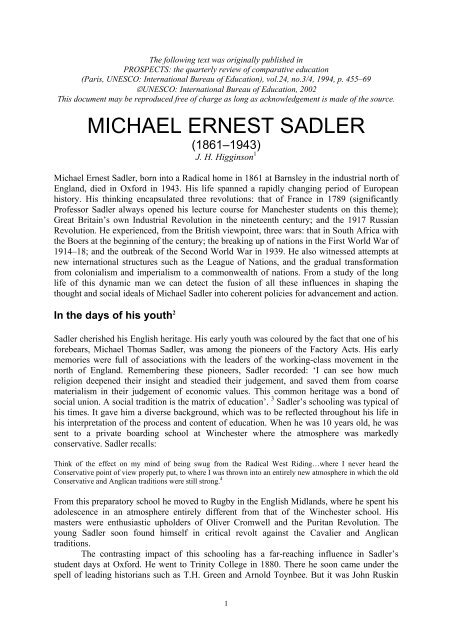
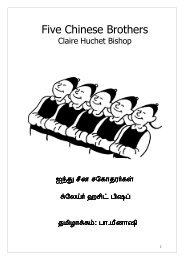
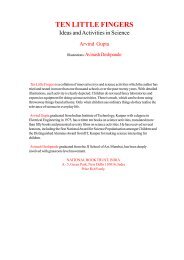
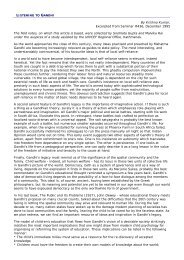
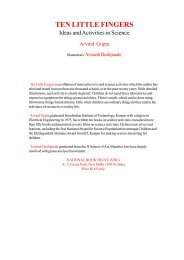
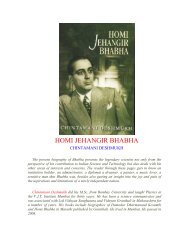
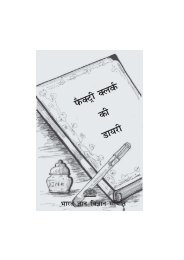

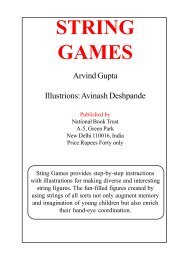

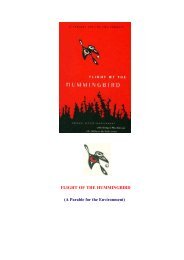
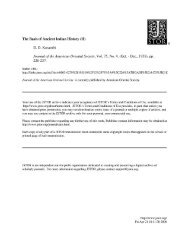
![tq,a] diM+s vkSj vk/qfud ekuo - Vidya Online](https://img.yumpu.com/31264147/1/190x245/tqa-dim-s-vksj-vk-qfud-ekuo-vidya-online.jpg?quality=85)

